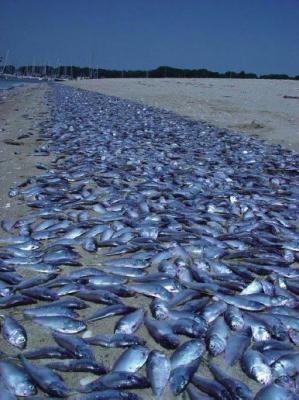 Have you ever heard of hypoxia, or the "dead zones" in our planet's oceans? They are areas of the ocean so starved for oxygen that nothing can live there. They are directly correlated to negative human impacts on the earth and have wiped out vast areas of oceanic habitat that once hosted diverse populations of sea life.
Have you ever heard of hypoxia, or the "dead zones" in our planet's oceans? They are areas of the ocean so starved for oxygen that nothing can live there. They are directly correlated to negative human impacts on the earth and have wiped out vast areas of oceanic habitat that once hosted diverse populations of sea life.
Dead zones are created when nutrients from fertilizers and waste end up in the ocean when rain washes them into rivers and streams that lead to the sea. These nutrients offset the natural balance in the ocean, creating the perfect environment for algae to bloom in huge numbers. Eventually this algae dies and sinks to the sea floor where it decays and destroys all of the oxygen, suffocating the plants and animals living in the area and creating an uninhabitable wasteland.
Robert Diaz, a professor at the Virginia Institute of Marine Science, recently led a study to count the number of dead zones on earth and his findings were very troubling. The number of dead zones has doubled every year since 1960. Diaz and his staff counted more than 400 currently existing dead zones around the world. These zones range from the massive ones in the Gulf of Mexico and Baltic Sea to smaller ones that appear in rivers and estuaries.
In the Chesapeake Bay alone, the amount of uninhabitable space caused by these dead zone conditions would have enough sea life to feed half of the commercial crab harvest for a year.
In an interview with the Washington Post, Robert Diaz said, "We're saying that hypoxia is now everywhere, it seems," said Diaz. "We can say that human activities really screwed up oxygen conditions in our coastal areas."
It is possible to recover these dead zones. Currently 4% of the total dead zones have shown some signs of recovery. Specifically, Florida's Indian River and New York's Hudson River have seen great improvement. Recovery requires significant changes in the use of fertilizers, the management of water run-off and improved water management.
As a consumer, oceanic dead zones are a great argument in favor of purchasing organic groceries that are not dependent on fertilizers and pesticides that contribute to these problems. As a voter, this is an issue your representatives should be made aware of.
To read the full Washington Post article on dead zones, click HERE.
14.8.08
Ocean's Dead Zones Doubling
Category:
Animals,
Recycling/Conservation
Subscribe to:
Post Comments (Atom)










No comments:
Post a Comment